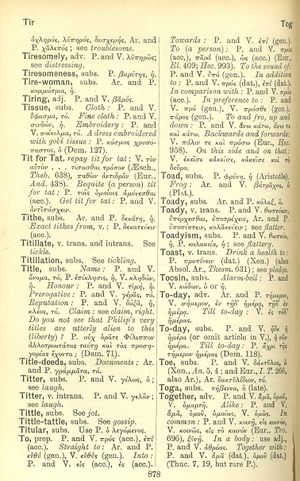to
οὐ μακαριεῖς τὸν γέροντα, καθ' ὅσον γηράσκων τελευτᾷ, ἀλλ' εἰ τοῖς ἀγαθοῖς συμπεπλήρωται· ἕνεκα γὰρ χρόνου πάντες ἐσμὲν ἄωροι → do not count happy the old man who dies in old age, unless he is full of goods; in fact we are all unripe in regards to time
English > Greek (Woodhouse)
preposition
P. and V. πρός (acc.), ἐπί (acc.).
straight to. Ar. and P. εὐθύ (gen.), V. εὐθύς (gen.).
into: P. and V. εἰς (acc.), ἐς (acc.).
towards: P. and V. ἐπί (gen.).
to (a person): P. and V. πρός (acc.), παρά (acc.), ὡς (acc.) (Eur., Electra 409; Hecuba 993).
to the sound of: P. and V. ὑπό (gen.).
in addition to: P. and V. πρός (dat.), ἐπί (dat.).
in comparison with: P. and V. πρός (acc.).
in preference to: P. and V. πρό (gen.), V. πρόσθε (gen.), πάρος (gen.).
to and fro, up and down: P. and V. ἀνω κάτω, ἄνω τε καὶ κάτω.
backwards and forwards: V. πάλιν τε καὶ πρόσω (Eur., Hecuba 958).
on this side and on that: V. ἐκεῖσε κἀκεῖσε, κἀκεῖσε καὶ τὸ δεῦρο.

